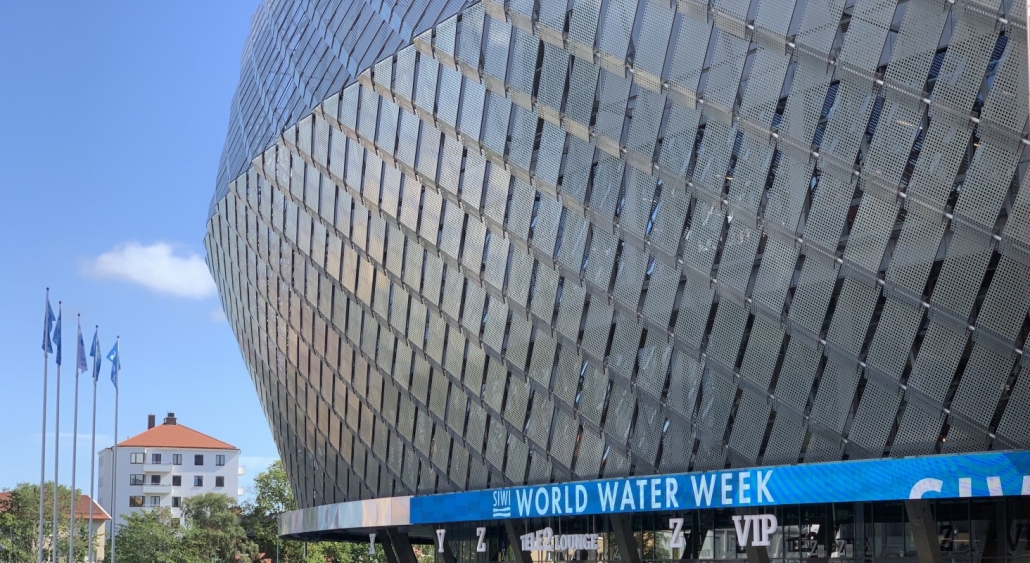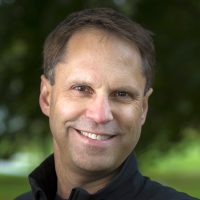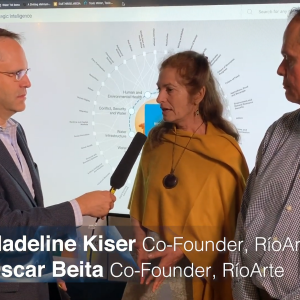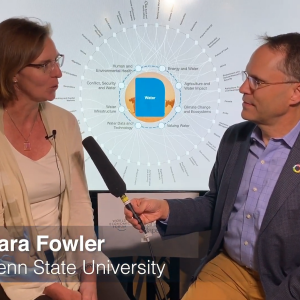A conversation with Silvia Cruz-Vargas, Social Impact Director at PepsiCo.
Speakers
Silvia Cruz-Vargas
Silvia Cruz-Vargas is the Social Impact Director at PepsiCo.
J. Carl Ganter
J. Carl Ganter is co-founder and director of Circle of Blue, the center for frontline reporting, research, and analysis on water resource issues and their relationship to food and energy in a changing climate.
PepsiCo’s Social Impact Director Silvia Cruz-Vargas discusses collaboration between the public and private sectors in addressing water challenges, supporting water programs across the globe, and much more.
Transcript
J. Carl Ganter: We’re here on the floor of World Water Week, and I’m here with Silvia Cruz-Vargas from PepsiCo Foundation. This is the second to last day of World Water Week, but I guess beginning of a really interesting year ahead. We’re at a crucial time in the planet’s history and the planet’s state of world water.
So from PepsiCo’s perspective, one, I imagine it’s probably obvious, but people still probably ask you why you’re interested in supporting water programs around the world and particularly in Central and South America? Tell me a little bit about that.
Silvia Cruz-Vargas: Of course, Carl. We at PepsiCo have a very comprehensive positive water impact strategy. It has two main components, one looking at our operations within the company, and one also looking at society. When we look at the society community component, we set forward a publicly-stated goal of providing access to clean, safe water to 25 million people by 2025. We have been doing this work since 2006 in collaboration mainly with seven strategic partners around the globe. As you point out, one of the main components being across Latin America. In Latin America, we partnered with the Inter-American Development Bank. We are actually the only private sector donor to the IDB’s AquaFund, a water fund that is looking forward to provide water access and sanitation services for Latin American communities as a whole.
Our collaboration is centered on the topic of dispersed rural communities, those that are actually quite on point for the topic of this World Water Week, which is leave no one behind. Those dispersed rural communities are communities in which usually other actors don’t provide those basic services.
The origins of our public-private partnership had a main goal, and it was to tackle those that we call the last mile and find a way to reach them, whether through pilot programs that will be scalable and adopted by government agencies or such, and at the same time making sure that the lessons learns, the scalability and sustainability of those programs was inherited in those specific locations.
J. Carl Ganter: Wow. So many questions coming to mind. Particularly, one of the new, well relatively new, numbers last year from the World Bank, 700 million people could be on the move in search of water by 2030. Now when we look at some of these goals, they sound great; but in the broader perspective, there’s a lot of work to do. How do you catalyze that scale? I mean, that’s one of the things that in a session on Sunday, there’s a lot of fear and a lot of it’s well-founded. So how do you catalyze that scale, whether you do the PepsiCo foundation, IDB, or a small NGO so we can meet this grand challenge?
Silvia Cruz-Vargas: Absolutely, and this is not a challenge for a single actor. From the private sector, from the public sector, from many sectors, this is a collaboration.
In our experience over the past nine years working with IDB, we have managed to catalyze $500 million U.S. That was be showcasing the lessons learned. When I say the lessons learned, I want to say the good, the bad, and the ugly. It’s so important that in each one of these programs, the fundamental lessons are being shared out, because there are always going to be some kind of nuances on the ground depending on where you work. The more those nuances are clear to new donors, new actors, even the communities that are going to be owning these programs, that’s how we have seen catalyzing impact from a people perspective, as well as from a financial perspective. The two are very different. Community ownership as well as government ownership … and when I say government ownership, at the local level maybe benefits into public policy perhaps or inclusion into public policy.
But on the financial level, it may very well be by showcasing to other external donors, like the European countries and their individual ways of giving, whether through their development agencies or such, that these programs actually deserve to be funded. We’ve seen over the years, that other public sector donors of the AquaFund have actually chipped in and contributed forwards.
J. Carl Ganter: But what about the private sector and the scale? I mean, again, back to scale. So catalyzing half a billion dollars, that’s congratulations, but what should that number really be? What’s that number need to get to?
Silvia Cruz-Vargas: I am unable to quantify the number, but I will absolutely tell you that it should be much larger, without a doubt. I’m here this week with colleagues from many peer companies of PepsiCo that are also working on this very same issues, as well as trying to be a contributor factor, a force for good, if you will, and many of which are investing into different platforms, whether is WRG 2030, whether it is through the UN CEO Water Mandate, whether it is to new, existing platforms that are actually coming to life during this World Water Week.
I also think that there is a play and a stronger opportunity for public-private partnerships. While the private sector has a role to play, absolutely no doubt there are other agencies like USAID that welcome the opportunity to work together to multiply that impact.
J. Carl Ganter: So SDG 17, of course, is collaboration and all the others. Water seems to run through every single one. Collaboration seems like the hardest SDG. You’ve had some success in that, but I think, again, just talking to people on the floor here and outside the water sector, that still seems to be one of the hardest things. How do you break that down more? How do you bring these different silos of organizations, public-private partnerships, a lot of buzzwords, how do you break that and, again, turn it into speed forward?
Silvia Cruz-Vargas: It’s a fascinating topic, I will say. And I think that is a topic that we are right now getting better at, but are not still yet to our maximum potential.
I offer two recommendations. One is to come with a pre-competitive spirit to anything we do. In many instances, and I’m sure you have experience over the the week here, even the sessions compete with each other. So we always try to come up with that pre-competitive angle and trying to bring forward the lessons learned, because those lessons are for society overall, versus for our own company. That’s number one.
Number two, I also offer the point of view of having common goals. But those goal no being centric across a specific number. When I say a specific number is, yes indeed there was the opportunity to reach X amount of people or to reach and invest X amount of funding. You are going to get there eventually, and quantifiable results are going to be needed on an annual basis, because that’s how we work. But definitely, the opportunity to have a wide compass to start co-creating from is the most important one.
J. Carl Ganter: So when you get up in the morning, what … Let’s just ask the simple question. What’s the thing that you’re most worried about today or coming forward to next year that we don’t accomplish? And then I’ll ask you how did we, if we look back a year from now, how do we overcome that?
Silvia Cruz-Vargas: It’s an interesting question, and I will answer two different ways. Prior to this week, my morning worry was to make sure that what we are doing is actually scalable and sustainable. We don’t want the water to stop flowing. We want the water to keep flowing, and we also want community ownership of those solutions. We know that when we exit and leave is when we are going to be doing an excellent work, especially not being perpetually in any given place.
As I was attending this year’s conference, I came to realize that the topic of next year’s conference is climate change. And while it is absolutely relevant to the world dynamics, as you were eloquently pointing out, I been waking up worried about such 180 change, because the conversations must continue, and we should not tailor our conversation to a particular theme, in my view.
They are tremendous lessons that we are going to get all as a convening team here in Stockholm for next year’s conference. But if we are only limiting ourselves to the topic of climate change, we may be losing the human element behind that.
J. Carl Ganter: So it all comes down to human elements and human stories.
Silvia Cruz-Vargas: Not only human elements and human stories, but evidence-based human elements and human stories. As with everything, facts are very important. The devil, as they say, is on the details. But yes, behind every program that you see on this floor or in each one of the panels being had this week, there is a human element.
J. Carl Ganter: Well, it’s all about stories here at World Water Week and around the world. Most important story, I think, on the planet. Thank you so much for joining us Silvia Cruz-Vargas from the PepsiCo foundation.
Silvia Cruz-Vargas: Great. Thank you so much for having me.
J. Carl Ganter: I’m J. Carl Ganter here at World Water Week. Thanks for tuning in.







